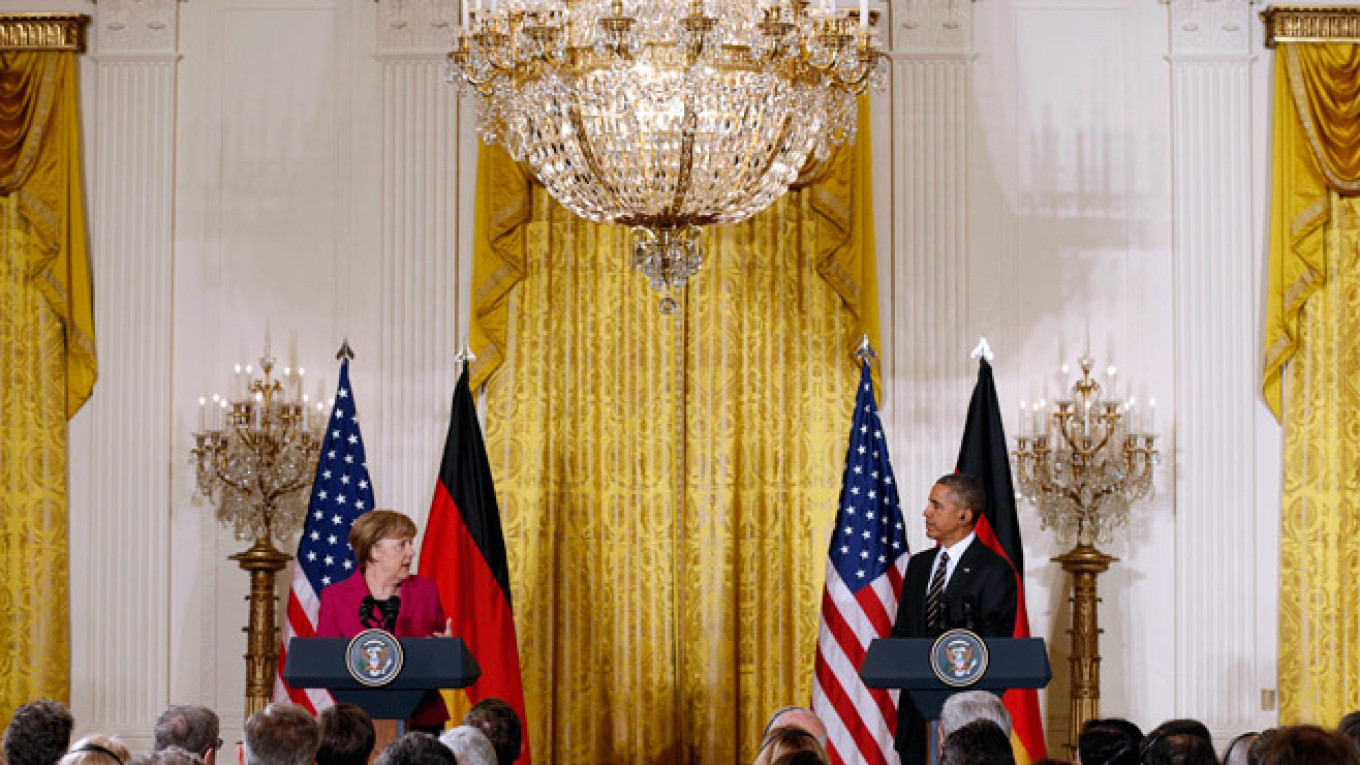As they struggle to stop the fighting in Ukraine, Western leaders must not lose sight of President Vladimir Putin's attempts to reshape the international order.
As German Chancellor Angela Merkel and French President Francois Hollande try to make a Ukraine peace plan stick, their efforts risk being hampered by disunity among Western countries over whether or not to arm Ukraine. But regardless of the current disagreement between the United States and some of its European allies, Western leaders need to keep the broader strategic context in mind.
Both sides of the current debate have strong arguments. On the one hand, Ukraine is a victim of aggression and deserves the right to defend itself against separatist forces that Russia is clearly supplying and supporting. On the other hand, the supply of defensive weaponry to Ukraine has the potential to split the West and precipitate a wider war.
This is a dangerous moment for Western policy. Putin thrives on creating divisions in the West and he will feel doubtless emboldened by signs that U.S. policymakers are out of step with their European counterparts and support the view that Western military support to Ukraine is now necessary.
To manage the disagreement, Western leaders must remind themselves that they are engaged in three levels of interrelated conflict with Russia: first, over Russia's efforts to enlarge separatist-held territory as a means to force Kiev to reform the system of government in Ukraine; second, over the desire of a majority of Ukrainians to develop their country on a Western model outside a Russian zone of influence; and third, over a broader effort by Moscow to weaken and disrupt Western institutions.
These three levels of conflict reflect a single objective on the part of Moscow: to counter the forces of globalization and prevent Russia falling further behind as a strategic competitor of the West. Despite presiding over the period of greatest prosperity in Russian history, the Putin system has failed to lay the foundations for Russia's modernization and remains institutionally incapable of doing so.
Unable to reform, its focus is survival. In this view, a Western-orientated Ukraine is a challenge to survival of the system and must be undermined.
Western leaders find this logic hard to understand because it is anathema to them. For all its challenges, they see the era of globalization as a historical opportunity to be embraced, not rejected. As a result, Putin's brinkmanship continues to surprise and frustrate them.
The foundation for an effective response is a clear signal to the Kremlin that the West will resist Russia's broader goal of rebalancing global forces, including by deploying its economic power. For all the West's economic woes, it has vastly superior resources compared to Russia.
Merkel is right in pointing out that Russia's conflict with the West needs to be viewed in a broader timeframe and that Western countries tend to lose heart too easily in dealing with Russia.
Western leaders need to keep this perspective in their efforts to achieve a durable cease-fire in eastern Ukraine and create short- to medium-term policies for supporting Ukraine's efforts to reform. They must also avoid presenting a cease-fire as a "solution" to the conflict.
The West's message to the Russian elite should be simple: You will not succeed in creating new international rules by breaking the old ones. Russia has been down this road before and it ended badly. But there is a chance to redefine your goals before it is too late.
Putin on his own may not be for turning. Yet, faced with Western resolve to defeat his broader policies, parts of the elite, at least, are likely to think twice about where he is leading them.
John Lough is an associate fellow at the Russia and Eurasia Program at Chatham House. A version of this article was originally published by Chatham House.
A Message from The Moscow Times:
Dear readers,
We are facing unprecedented challenges. Russia's Prosecutor General's Office has designated The Moscow Times as an "undesirable" organization, criminalizing our work and putting our staff at risk of prosecution. This follows our earlier unjust labeling as a "foreign agent."
These actions are direct attempts to silence independent journalism in Russia. The authorities claim our work "discredits the decisions of the Russian leadership." We see things differently: we strive to provide accurate, unbiased reporting on Russia.
We, the journalists of The Moscow Times, refuse to be silenced. But to continue our work, we need your help.
Your support, no matter how small, makes a world of difference. If you can, please support us monthly starting from just $2. It's quick to set up, and every contribution makes a significant impact.
By supporting The Moscow Times, you're defending open, independent journalism in the face of repression. Thank you for standing with us.
Remind me later.


